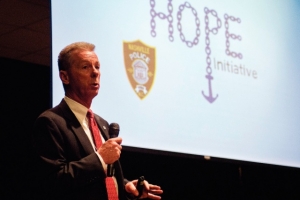Conference talks gangs, human trafficking, drugs
By Ethan Smith
Published in News on January 6, 2017 9:57 AM

News-Argus/SETH COMBS
Nashville Police Chief Thomas Bashore speaks about the links between automobile break-in cases and heroin addiction in his town at the University of Mount Olive Thursday morning.
MOUNT OLIVE -- Around 200 law enforcement and social work professionals converged on the University of Mount Olive Thursday for the 11th annual Eastern North Carolina Gang Conference.
The daylong event covered subject matter ranging from human trafficking, drug abuse and gang intervention.
Thomas Bashore and Henry Raper were the keynote speakers, who opened the day by talking about Nashville's HOPE Initiative.
The HOPE Initiative is modeled after a program in Massachusetts in which drug addicts can voluntarily come to the police department and seek help for their addiction.
This entails the ability for people to hand paraphernalia and controlled substances directly to a police officer and not be charged with a crime, but instead be put on a treatment track to help them overcome their addiction.
Bashore, Nashville's police chief, said this is not a soft approach to crime. People will still be charged with drug offenses if drugs are found in their possession and they are not voluntarily seeking help for their addiction.
Bashore added that since implementing the program in Nashville in February 2016, the town has seen a 30 to 40 percent decrease in property crimes such as motor vehicle break-ins and larceny offenses.
This is because, Bashore said, drug addicts will often commit property crimes to help pay for their addiction.
Bashore said he could not speak to whether the initiative, which is still in its first year, had reduced gang activity, because Nashville has little to none, and therefore he can't know how it would help curb gang issues.
"Obviously, there's gangs all over," Bashore said. "But we don't have the overt gang activity that some communities do. I don't have anything to substantiate yes, we've seen a decrease in gang activity or anything visual. Honestly, we just don't get graffiti. We don't get any of that stuff. We're a bedroom community, in that we have gang members that sleep in Nashville, but when they go do their dirt they go somewhere else."
Bashore said 96 people -- two from California and others from across North Carolina -- have taken advantage of the program so far.
Of those 96 people, only nine have relapsed. Bashore said of the people in the program, 64 were male and 32 are female.
Raper, Nashville's town manager, said the program was designed to specifically aid heroin and opioid addiction, which is higher now across the nation than it has been in many years. But, Bashore added, the program is open to anyone with a drug addiction, including alcoholics, cocaine addicts and others, who also need help.
Programs like the HOPE Initiative -- which, Bashore said, is the only one of its kind in the state that he knows of -- are needed in southern states. This is because heroin and opioid abusers are most likely to live in the rural south than anywhere else in the nation, Raper said.
After Thursday morning's keynote speeches, there were multiple breakout sessions attendees could go to, which were held at both 10:45 a.m. and 2:45 p.m.
There were two breakout sessions held for law enforcement only, which were conducted by Walter Howard, with the Goldsboro Police Department's Gang Suppression Unit, and Jane Jackson, who is the Deputy Chief of the Violent Crimes section of the U.S. Attorney's Office of the Eastern District of North Carolina.
Howard discussed how GPD's gang unit operates, while Jackson spoke on how the Hobbs Act can be used to prosecute violent criminals and gang members.
Breakout sessions that were open to the public included forums on human trafficking, gang intervention, a basic overview of how gangs operate and the basics of substance abuse and how to handle those who are addicted to drugs.
The conference adjourned around 4 p.m. Thursday.
